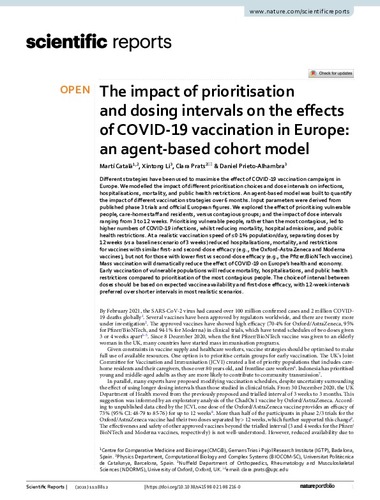Mostra el registre d'ítem simple
The impact of prioritisation and dosing intervals on the effects of COVID-19 vaccination in Europe: an agent-based cohort model
| dc.contributor.author | Català Sabaté, Martí |
| dc.contributor.author | Li, Xintong |
| dc.contributor.author | Prats Soler, Clara |
| dc.contributor.author | Prieto Alhambra, Daniel |
| dc.contributor.other | Universitat Politècnica de Catalunya. Departament de Física |
| dc.date.accessioned | 2021-11-02T15:29:14Z |
| dc.date.available | 2021-11-02T15:29:14Z |
| dc.date.issued | 2021-09-22 |
| dc.identifier.citation | Català, M. [et al.]. The impact of prioritisation and dosing intervals on the effects of COVID-19 vaccination in Europe: an agent-based cohort model. "Scientific reports", 22 Setembre 2021, vol. 11, p. 18812/1--10. |
| dc.identifier.issn | 2045-2322 |
| dc.identifier.uri | http://hdl.handle.net/2117/355250 |
| dc.description.abstract | Different strategies have been used to maximise the effect of COVID-19 vaccination campaigns in Europe. We modelled the impact of different prioritisation choices and dose intervals on infections, hospitalisations, mortality, and public health restrictions. An agent-based model was built to quantify the impact of different vaccination strategies over 6 months. Input parameters were derived from published phase 3 trials and official European figures. We explored the effect of prioritising vulnerable people, care-home staff and residents, versus contagious groups; and the impact of dose intervals ranging from 3 to 12 weeks. Prioritising vulnerable people, rather than the most contagious, led to higher numbers of COVID-19 infections, whilst reducing mortality, hospital admissions, and public health restrictions. At a realistic vaccination speed of¿=¿0·1% population/day, separating doses by 12 weeks (vs a baseline scenario of 3 weeks) reduced hospitalisations, mortality, and restrictions for vaccines with similar first- and second-dose efficacy (e.g., the Oxford-AstraZeneca and Moderna vaccines), but not for those with lower first vs second-dose efficacy (e.g., the Pfizer/BioNTech vaccine). Mass vaccination will dramatically reduce the effect of COVID-19 on Europe’s health and economy. Early vaccination of vulnerable populations will reduce mortality, hospitalisations, and public health restrictions compared to prioritisation of the most contagious people. The choice of interval between doses should be based on expected vaccine availability and first-dose efficacy, with 12-week intervals preferred over shorter intervals in most realistic scenarios |
| dc.language.iso | eng |
| dc.publisher | Nature |
| dc.rights | Attribution-NonCommercial-NoDerivs 3.0 Spain |
| dc.rights.uri | http://creativecommons.org/licenses/by-nc-nd/3.0/es/ |
| dc.subject | Àrees temàtiques de la UPC::Matemàtiques i estadística::Anàlisi numèrica::Modelització matemàtica |
| dc.subject.lcsh | COVID-19 (Disease) |
| dc.subject.lcsh | Vaccination |
| dc.subject.lcsh | Communicable diseases |
| dc.title | The impact of prioritisation and dosing intervals on the effects of COVID-19 vaccination in Europe: an agent-based cohort model |
| dc.type | Article |
| dc.subject.lemac | COVID-19 (Malaltia) |
| dc.subject.lemac | Vacunació |
| dc.subject.lemac | Malalties transmissibles |
| dc.contributor.group | Universitat Politècnica de Catalunya. BIOCOM-SC - Grup de Biologia Computacional i Sistemes Complexos |
| dc.identifier.doi | 10.1038/s41598-021-98216-0 |
| dc.description.peerreviewed | Peer Reviewed |
| dc.relation.publisherversion | https://www.nature.com/articles/s41598-021-98216-0 |
| dc.rights.access | Open Access |
| local.identifier.drac | 32049695 |
| dc.description.version | Postprint (published version) |
| local.citation.author | Català, M.; Li, X.; Prats, C.; Prieto-Alhambra, D. |
| local.citation.publicationName | Scientific reports |
| local.citation.volume | 11 |
| local.citation.startingPage | 18812/1 |
| local.citation.endingPage | -10 |
| dc.description.sdg | Objectius de Desenvolupament Sostenible::3 - Salut i Benestar |
| dc.description.sdg | Objectius de Desenvolupament Sostenible::3 - Salut i Benestar::3.3 - Per a 2030, posar fi a les epidèmies de la sida, tuberculosi, malària i les malalties tropicals desateses, i combatre l’hepatitis, les malalties transmeses per l’aigua i altres malalties transmissibles |
Fitxers d'aquest items
Aquest ítem apareix a les col·leccions següents
-
Articles de revista [2.208]
-
Articles de revista [226]
-
Col·lecció especial COVID-19 [633]


